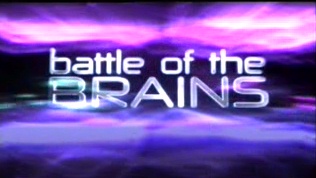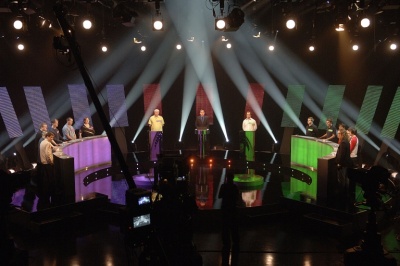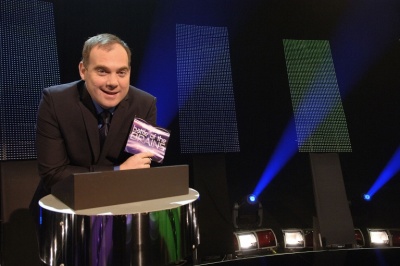Battle of the Brains
(→See also) |
|||
| (One intermediate revision not shown) | |||
| Line 29: | Line 29: | ||
After the five head-to-heads, five players will have been eliminated, and there will be an imbalance between the teams. In round two, a question is read out and the team captain selects someone from the opposing team to answer. A wrong answer eliminates that player; a correct answer does nothing but maintain the status quo. Questions alternate until one team is completely eliminated. | After the five head-to-heads, five players will have been eliminated, and there will be an imbalance between the teams. In round two, a question is read out and the team captain selects someone from the opposing team to answer. A wrong answer eliminates that player; a correct answer does nothing but maintain the status quo. Questions alternate until one team is completely eliminated. | ||
| + | |||
| + | <div class=image>[[File:Battleofthebrainsset.jpg|400px]]''The round shaped set.''</div> | ||
For the endgame, the winning team is reconstituted, there are 90 seconds on the clock, questions are read out and the team captain chooses which player will answer. The team must assemble six consecutive right answers, one from each member of the team, to win the jackpot (£2000 in the first series, an accumulated rollover fund of £1000 a day in the second). | For the endgame, the winning team is reconstituted, there are 90 seconds on the clock, questions are read out and the team captain chooses which player will answer. The team must assemble six consecutive right answers, one from each member of the team, to win the jackpot (£2000 in the first series, an accumulated rollover fund of £1000 a day in the second). | ||
| Line 38: | Line 40: | ||
However... there are a few things wrong with this show, things that Mr. Young would probably have ironed out. First of all, we have the host. Paddy O'Connell came across as rather anonymous, and that's not just because he didn't introduce himself and nobody thought to provide him with a name caption at the top of the show. He's a competent host, but it felt like he was playing to the studio audience. The studio audience didn't respond, for the very good reason that there wasn't one. An audience was added for the second series, but O'Connell was gone. It would have been interesting to see if he'd come across better with a live audience - our hunch is that he would. | However... there are a few things wrong with this show, things that Mr. Young would probably have ironed out. First of all, we have the host. Paddy O'Connell came across as rather anonymous, and that's not just because he didn't introduce himself and nobody thought to provide him with a name caption at the top of the show. He's a competent host, but it felt like he was playing to the studio audience. The studio audience didn't respond, for the very good reason that there wasn't one. An audience was added for the second series, but O'Connell was gone. It would have been interesting to see if he'd come across better with a live audience - our hunch is that he would. | ||
| - | <div class=image>[[ | + | <div class=image>[[File:Battleofthebrains paddyoconnell card.jpg|400px]]''Ol' Wotsisface''</div> |
Meanwhile, there's a big flaw in the format: it builds to a complete anticlimax. Firstly we have the endgame itself. The team has 90 seconds to complete a chain of six correct answers, but it takes about 35 seconds to do so, which means that if they get a wrong answer in the last third of the game, they're just running down the clock with no real chance of winning. Furthermore, while there's something to be said for having a properly challenging endgame, this one is perhaps a little too difficult, and there's a huge disparity between the difficulty of the game and the prize on offer. Even if a team does string together six correct answers (and they usually don't), the prize money can be fairly paltry. In the first series the top prize was only £2000, split seven ways, which is almost an insult. There were no lesser prizes, and unwon prizes did not roll over. At least on [[Eggheads]], you know that the money ''will'' be won, sooner or later. Here, it was like they were trying not to give the money away at all. Our response at the time was that it might actually be better to do away with the prize money altogether and institute a series championship scheme instead, though the actual solution for series two is quite pleasing - just a £1000 daily prize, but it now rolls over, and should provide some substantial jackpots. | Meanwhile, there's a big flaw in the format: it builds to a complete anticlimax. Firstly we have the endgame itself. The team has 90 seconds to complete a chain of six correct answers, but it takes about 35 seconds to do so, which means that if they get a wrong answer in the last third of the game, they're just running down the clock with no real chance of winning. Furthermore, while there's something to be said for having a properly challenging endgame, this one is perhaps a little too difficult, and there's a huge disparity between the difficulty of the game and the prize on offer. Even if a team does string together six correct answers (and they usually don't), the prize money can be fairly paltry. In the first series the top prize was only £2000, split seven ways, which is almost an insult. There were no lesser prizes, and unwon prizes did not roll over. At least on [[Eggheads]], you know that the money ''will'' be won, sooner or later. Here, it was like they were trying not to give the money away at all. Our response at the time was that it might actually be better to do away with the prize money altogether and institute a series championship scheme instead, though the actual solution for series two is quite pleasing - just a £1000 daily prize, but it now rolls over, and should provide some substantial jackpots. | ||
| Line 54: | Line 56: | ||
== Web links == | == Web links == | ||
| - | [http://www.bbc.co.uk/programmes/b00hqlmd | + | [http://www.bbc.co.uk/programmes/b00hqlmd BBC programme page] |
[http://en.wikipedia.org/wiki/Battle_of_the_Brains_(TV_series) Wikipedia entry] | [http://en.wikipedia.org/wiki/Battle_of_the_Brains_(TV_series) Wikipedia entry] | ||
Current revision as of 23:02, 26 December 2023
Contents |
Host
Paddy O'Connell (2008)
Nicky Campbell (2009)
Broadcast
Shine North and BBC Manchester for BBC Two, 28 July 2008 to 6 March 2009 (40 episodes in 2 series)
Synopsis
A daily challenge for two teams attempting to win cash.
Two teams play, each consisting of six active players plus a captain. The first round, which takes up about half the show, consists of a series of five head-to-head games. Given the category (though not the game format), the team captains must choose one of their team to play, each team member can play only one of the head-to-heads and the losing player is eliminated. The games are as follows:
- "Accuracy": estimation questions, closer guess wins a point, first to two wins the game.
- "Identity": a series of clues is read out, first player to buzz in with the correct answer wins the game. A wrong answer freezes that player out for the next clue.
- "Wisdom": A basic speed quiz, the players get 60 seconds each, most right answers wins. And no, we don't get what that's got to do with wisdom either. Maybe we're just not wise enough to understand.
- "Speed": Questions on the buzzer, first to five correct answers (three in the first series) wins.
- "Memory": Name things in a given category, first to fail or repeat an answer loses.
- "Nerve": Questions in pairs, the game ends when the winning player answers correctly and the losing player... doesn't.
After the five head-to-heads, five players will have been eliminated, and there will be an imbalance between the teams. In round two, a question is read out and the team captain selects someone from the opposing team to answer. A wrong answer eliminates that player; a correct answer does nothing but maintain the status quo. Questions alternate until one team is completely eliminated.
For the endgame, the winning team is reconstituted, there are 90 seconds on the clock, questions are read out and the team captain chooses which player will answer. The team must assemble six consecutive right answers, one from each member of the team, to win the jackpot (£2000 in the first series, an accumulated rollover fund of £1000 a day in the second).
Finally, there is the Captain's Question, in which the team choose one of two questions for the captain to answer, for the right to return on the next show.
This is not a 12 Yard production, but so blatant is the company's influence that we could fairly call it a "post-12 Yard" show. It wouldn't be at all surprising if it turned out the production staff wore bracelets bearing the inscription "WWDYD?". On the other hand, the one thing the sainted David Young tends to avoid at all costs, and that it is refreshing to see this show embrace, is featuring really good quiz players as contestants. Quite a few recognisable faces (alumni of shows like Mastermind and University Challenge) turned up during the first run of this show, and helped to create a feeling of real intellectual combat, rather than the one-sided competition of Eggheads.
However... there are a few things wrong with this show, things that Mr. Young would probably have ironed out. First of all, we have the host. Paddy O'Connell came across as rather anonymous, and that's not just because he didn't introduce himself and nobody thought to provide him with a name caption at the top of the show. He's a competent host, but it felt like he was playing to the studio audience. The studio audience didn't respond, for the very good reason that there wasn't one. An audience was added for the second series, but O'Connell was gone. It would have been interesting to see if he'd come across better with a live audience - our hunch is that he would.
Meanwhile, there's a big flaw in the format: it builds to a complete anticlimax. Firstly we have the endgame itself. The team has 90 seconds to complete a chain of six correct answers, but it takes about 35 seconds to do so, which means that if they get a wrong answer in the last third of the game, they're just running down the clock with no real chance of winning. Furthermore, while there's something to be said for having a properly challenging endgame, this one is perhaps a little too difficult, and there's a huge disparity between the difficulty of the game and the prize on offer. Even if a team does string together six correct answers (and they usually don't), the prize money can be fairly paltry. In the first series the top prize was only £2000, split seven ways, which is almost an insult. There were no lesser prizes, and unwon prizes did not roll over. At least on Eggheads, you know that the money will be won, sooner or later. Here, it was like they were trying not to give the money away at all. Our response at the time was that it might actually be better to do away with the prize money altogether and institute a series championship scheme instead, though the actual solution for series two is quite pleasing - just a £1000 daily prize, but it now rolls over, and should provide some substantial jackpots.
And then there's the problem of the Captain's Question. Yes, yes, nice idea to twist it around, but it simply doesn't work. It's anticlimactic and feels unfair. Just bring the team back the next day and ditch this pointless coda.
Battle of the Brains has its faults, then, but let's not be too harsh on it. It's nice to see something a bit more challenging on in the early evening, and post-12 Yard or not, it certainly makes a pleasant change from that other quiz show that's always on... you know, the one David Young does do.
Trivia
The show went out in the 6pm slot usually occupied by Eggheads.
Rather sweetly, the teams are actually listed (collectively, not individually) in the end credits right after the host.




